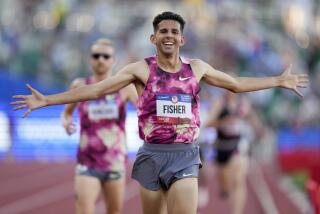For Frank Shorter, the Longer He Runs the Better It Becomes
- Share via
Last Halloween, the day he turned 40, Frank Shorter discovered he had been the victim of a monstrous hoax.
He woke up, felt fine, went for a run, didn’t die.
So now Frank Shorter, the only American marathoner since 1908 to win an Olympic gold medal, is unretired, a competitive runner once more. An inspiration to all of us over-40 athletes who haven’t yet used up our college eligibility.
“You like to think you aren’t subject to the power of suggestion,” Shorter says, “but when I got to 36, I began to believe what people said about slowing down. That lasted a few years, I submerged myself in my business, in TV work. I would still run 80 to 100 miles a week, but not so hard.”
Right, an easy 100 miles a week. Life’s warm-down.
“When I got to the middle of 39, I decided I’d focus back on running, so even if it (the rumor of athletic death for all at age 40) was true, maybe I’d have a chance to win within the Masters group.”
What Shorter pounded back into shape was the softest and most vital organ in an athlete’s body--the brain. Now he’s a real runner again, not just a well-preserved relic.
Frank should have realized that 40 stuff was a bad rumor. Nobody knows the mental game of running better than Professor Shorter.
For example, when it comes to heat, marathoners and chocolate bars have the same reaction. Meltdown. In next Sunday’s L.A. Marathon, in the field of 15,000, Shorter will be the only runner praying for the sun to beat down.
“I do well in the heat because I’m skinny,” Shorter says.
Most world-class marathoners, of course, are built like W. C. Fields.
“It’s psychology,” Shorter admits. “No one runs as fast in the heat, but I can run closer to my best than other runners can.”
Shorter will also be the only guy at the starting line sniffing the air and saying, “Ah, I love the smell of ozone in the morning.”
“I think smog is overrated,” Shorter says. “I don’t find it affects you that much. I’ve run in Los Angeles a lot. A certain amount of CO-2 in the air doesn’t bother me. Again, it’s a mental thing.”
But if you want real sacrilege, check this: Shorter doesn’t even believe in shoes . That is, he doesn’t hold to the modern belief that the new high-tech shoes have revolutionized running.
“The shoes are no better than they were 15 years ago,” Shorter says. “The changes are in the ability to market the shoes. But I’m susceptible to marketing. I’m sitting here in my acid-washed jeans. I don’t belittle the new shoes, because they can give you a psychological lift. Even if your instincts tell you there’s no difference, it never hurts, so I’ll wear the latest shoes.
“You have to make (opponents) think,” Shorter goes on. “In ’74 at the Fukuoka Marathon in Japan, at the starting line I pulled off my sweats and I was wearing the first pair of stripped shorts ever worn in international competition. Two hundred and fifty heads turned and stared at me.”
To this day, Shorter is convinced that his surprise pants helped him smoke the stunned field. Actually, those 250 runners weren’t frightened by Shorter’s shorts, but by his legs and heart. They simply knew who he was, the greatest runner of his day. He could have been wearing a supermarket plastic bag for running pants and it wouldn’t have made any difference.
But don’t tell Frank. He knows psychology. He has been on both ends of it.
After he won the Olympic marathon in 1972, Shorter finished second in ’76 when he was outpsyched by East Germany’s Waldemar Cierpinski, who pulled alongside Shorter in midrace and stared him down.
“I knew all about him,” Cierpinski has said, “and yet I could tell by the return glance that he didn’t know much, if anything, about me. The psychological advantage was mine.”
That would have been a good time for Shorter to pull out a propeller beanie or wax lips, to launch a psychological counter-attack. But Frank was too stunned.
Sixteen years later, Shorter has declared psychological war on the myths of aging.
“Now that I’m really getting fit again, I’m finding there isn’t that much difference (being over 40),” Shorter says. “The old thing that you don’t recover as fast, well, I’m finding I do. I’m in the curiosity stage, trying to train and race well, see how close I can come to what I was 15 years ago. The more I go against accepted theory, the more fun I can have.
“The old theories of the aging process, I’m not so sure they are true. All of us over 40 are chasing Jack Foster, who ran a 2:11 when he was 42. Perhaps he was not a freak of nature. Maybe all the problems associated with getting older have more to do with becoming slightly out of shape.”
Problems like gray hair?
Anyway, Shorter will run Sunday in the Masters Division of the L.A. Marathon, striving for a sub-2:20 time as he slowly trains his way back to, who knows--Olympic form?
It will be hard to shock this field with something like stripped pants. Nowadays there are races where runners show up in no pants.
Shorter will simply have to outrun the other Masters.
As Maxwell Smart would say, “It’s an old trick, but it just might work.”
More to Read
Go beyond the scoreboard
Get the latest on L.A.'s teams in the daily Sports Report newsletter.
You may occasionally receive promotional content from the Los Angeles Times.






